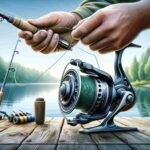Fishing is a beloved pastime for many people, but there is often debate over which technique is harder: fly fishing or regular fishing. Fly fishing involves using a specialized rod and reel with a weighted line and artificial fly to catch fish, while regular fishing typically involves a simpler rod and reel with bait or lures. Both techniques have their advantages and disadvantages, and the difficulty level is subjective.
In this article, I will explore the differences between fly fishing and regular fishing, discuss the factors that contribute to their difficulty levels, and examine the advantages of each technique. By the end of this post, you should have a better understanding of which fishing technique is right for you.
Differences between Fly Fishing and Regular Fishing
Fly fishing and regular fishing are two distinct techniques with their own unique equipment and styles. Here are some key differences between the two:
Fly Fishing
- Uses a specialized rod and reel with a weighted line and artificial fly
- The fly is used to mimic the insects or baitfish that the fish are feeding on
- Casting technique involves using a back-and-forth motion to create momentum and send the fly to the desired location
- Generally used in freshwater, but can also be used in saltwater
Regular Fishing
- Uses a simpler rod and reel with bait or lures
- Bait or lures are used to attract fish to bite
- Casting technique involves using a flicking motion to send the bait or lure to the desired location
- Can be used in both freshwater and saltwater
Comparison of the two fishing techniques
- Fly fishing is typically seen as a more specialized and sophisticated technique, while regular fishing is more accessible and easier to learn
- Fly fishing requires more skill and technique to master, while regular fishing is more forgiving for beginners
- Fly fishing is often associated with targeting specific species of fish, while regular fishing can be used for a wide variety of fish
- Fly fishing is generally considered more environmentally friendly as it is a catch-and-release technique, while regular fishing may result in unintentional harm to the fish
The Difficulty of Fly Fishing vs. Regular Fishing
The difficulty of fly fishing vs. regular fishing is subjective and can depend on various factors. Here are some factors that contribute to the difficulty of each technique:
Factors that contribute to the difficulty of Fly Fishing
- Casting technique – fly fishing requires a more complex casting technique than regular fishing, which can take time and practice to master.
- Equipment – fly fishing equipment is specialized and can be expensive, requiring a higher level of investment and maintenance than regular fishing equipment.
- Fish behavior – fly fishing often involves targeting specific species of fish that are more selective in their feeding habits, making it more challenging to catch them with an artificial fly.
Factors that contribute to the difficulty of Regular Fishing
- Finding the fish – regular fishing involves finding the fish, which can require more knowledge of their behavior and habitat than fly fishing.
- Bait selection – choosing the right bait or lure for the fish species can be challenging and may require trial and error.
- Equipment – while regular fishing equipment is generally simpler than fly fishing equipment, it can still require a certain level of skill to use effectively.
Comparison of the difficulty levels between Fly Fishing and Regular Fishing
- Fly fishing is generally considered more difficult than regular fishing due to the complex casting technique and specialized equipment required.
- However, the difficulty level can vary depending on the individual’s skill level and the fishing conditions.
Overall, both fly fishing and regular fishing require skill and practice to master, but the difficulty level can vary depending on the individual and the fishing conditions.
Advantages of Fly Fishing
Fly fishing offers several advantages over regular fishing. Here are some of the main advantages of fly fishing:
Environmental benefits
- Fly fishing is generally a catch-and-release technique, which means that fish are not harmed in the process. This can help to maintain healthy fish populations and protect the ecosystem.
Health benefits
- Fly fishing is a low-impact form of exercise that can provide physical and mental health benefits. It can help to improve cardiovascular health, reduce stress and anxiety, and increase overall well-being.
Personal satisfaction
- Fly fishing requires a higher level of skill and technique than regular fishing, which can provide a greater sense of personal satisfaction and accomplishment when a fish is caught. It can also be a more immersive experience, allowing the angler to connect with nature and the environment.
Fly fishing offers a unique and rewarding fishing experience that can provide environmental, health, and personal benefits. It requires more skill and technique than regular fishing, but the rewards can be well worth the effort.
Advantages of Regular Fishing
Regular fishing also offers several advantages over fly fishing. Here are some of the main advantages of regular fishing:
Versatility
- Regular fishing can be used in a variety of fishing environments, including freshwater and saltwater, as well as different types of water bodies such as lakes, rivers, and oceans. This makes it a more versatile option for anglers who want to target different fish species.
Cost-effectiveness
- Regular fishing equipment is generally less expensive than fly fishing equipment, making it a more affordable option for anglers who are just starting out or on a tight budget.
Ease of learning
- Regular fishing requires less skill and technique than fly fishing, making it easier for beginners to learn and get started with the sport. This can make it a more accessible option for those who are new to fishing or just want to enjoy a more casual fishing experience.
Regular fishing offers a versatile, cost-effective, and easy-to-learn fishing experience that can be enjoyed by anglers of all skill levels. While it may not offer the same level of challenge or personal satisfaction as fly fishing, it can still provide a rewarding and enjoyable fishing experience.
Conclusion
In conclusion, the debate over whether fly fishing or regular fishing is harder ultimately depends on the individual’s skill level and preferences. Both techniques offer their own unique advantages and challenges.
Fly fishing is a specialized technique that requires a higher level of skill and technique, but can provide environmental, health, and personal benefits. It can be a rewarding experience for those who are willing to invest the time and effort to master it.
On the other hand, regular fishing is a versatile, cost-effective, and easy-to-learn technique that can be enjoyed by anglers of all skill levels. It offers a more accessible and casual fishing experience that can be tailored to individual preferences.
Ultimately, the choice between fly fishing and regular fishing comes down to personal preference and the type of fishing experience that an angler is looking for. Regardless of which technique is chosen, fishing offers a unique and rewarding way to connect with nature and enjoy the great outdoors.










